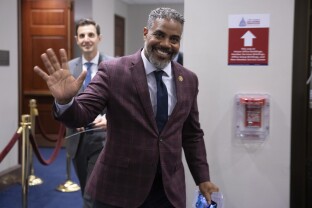Rep. Yvette Clarke is set to become the next chair of the powerful Congressional Black Caucus when the group votes for new leadership in December, not only because the group supports her, but because she’s the only one running for the spot.
But Rep. Steven Horsford, the current CBC chair, was quietly eyeing a bid for a second term, three sources confirmed to NOTUS, despite caucus rules that members can only serve as chair for one term.
As recently as “late last week,” Horsford was telling people that he was “interested in being chair again,” a source familiar with CBC leadership dynamics said.
“It’s hard for a young member to be chair and transition to just being a regular member without leaving Congress,” this source said of Horsford. “It would have been a different scenario had we had the White House.”
One CBC member told NOTUS Horsford didn’t personally approach them to seek support, but they’d heard about his intentions anyway.
A Democrat familiar with CBC dynamics also confirmed Horsford wanting to run again wasn’t “terribly public knowledge,” but he’d floated the idea to a few people in Washington’s political class.
Horsford has since decided not to pursue the CBC chairmanship. A source said that changing the bylaws to run would have been an unnecessary fight for the typically tight-knit group. Horsford’s office declined to comment.
CBC members say that Clarke is an obvious choice to lead the group: She is the heir apparent (she’s currently the 1st vice chair), has held other leadership roles in the caucus and is well-liked by many of the members.
“Yvette and I are very close,” Rep. Robin Kelly told NOTUS. “She’s a smart, compassionate member, empathetic, knows the issues and is very inclusive.”
“She adds a little spice to us,” Kelly added. “So I expect some things to be shaken up.”
Rep. Troy Carter, who said last week he would not run for the caucus’s top spot, was also privately encouraged to make a bid for the leadership role, a Democrat said.
One of the reasons Carter pulled his name out of consideration, this source added, was out of respect to Clarke’s seniority.
“It would’ve been an unnecessary fight,” they said. There was also a fear of repeating history: When Clarke last ran for CBC chair, Louisiana Rep. Cedric Richmond entered the race “at the last minute” and beat her. (Carter’s office said in a statement to NOTUS he’s “honored to serve” as 1st vice chair in the new Congress and he “wholeheartedly” supports Clarke’s run for CBC chair.)
For now, Clarke runs unchallenged and is poised to lead the caucus during a historic time where the CBC wields significant influence among House Democrats. They were influential in Joe Biden ending his second presidential bid. And a CBC member, Hakeem Jeffries, could someday be the first-ever Black House speaker if Democrats retake the majority in 2026.
Rep. Clarke’s office was unable to provide comment by publication.
Rep. Emilia Sykes spoke lovingly of Clarke, recounting an instance when Clarke campaigned in her Trump-won, majority white district in Ohio.
“She’s going to take all this information and help lead us in a way that we can position ourselves to best serve our communities and our constituencies and uplift the voices of CBC members and those that we represent,” she told NOTUS.
Rep. Glenn Ivey agreed, emphasizing that Clarke has “been here a while” and that she’s “got that experience.”
“She’s always been very active in the Black Caucus, and she certainly has been in the last Congress,” he told NOTUS. “So I think it’s a good transition.”
—
Tinashe Chingarande and Violet Jira are NOTUS reporters and Allbritton Journalism Institute fellows.
Sign in
Log into your free account with your email. Don’t have one?
Check your email for a one-time code.
We sent a 4-digit code to . Enter the pin to confirm your account.
New code will be available in 1:00
Let’s try this again.
We encountered an error with the passcode sent to . Please reenter your email.


